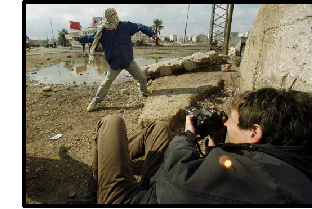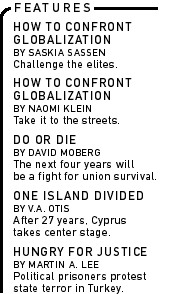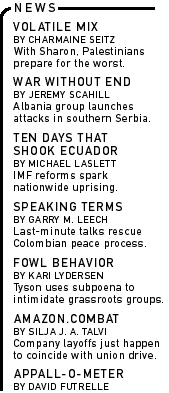|
Night has fallen here. Not far from Christian holy sites, Israeli
gunfire hails on Bethlehem. Palestinian gunmen just killed an Israeli
settler driving nearby, and for more than an hour, Israeli tanks
and machine-guns have fired on Bethlehem's residential areas in
an unsuccessful attempt to seek out the Palestinian shooters. The
townspeople sit in the dark, listening for ambulances and waiting
for the battle to subside.
Just a week earlier, Ariel Sharon was elected prime minister of
Israel and already the tension is building. Since the February 6
election, Palestinian attacks on Israeli settlements have increased--only
to be met by intense Israeli retaliation. On February 8, Israeli
tanks shelled the Palestinian towns of Ramallah and Al-Bireh for
four hours straight. Despite severe damage to Palestinian homes
and a medical clinic, no one on either side was seriously injured.
"Sharon's success has introduced an escalation," says Abbas Zaki,
a leader of Fateh, Palestinian President Yasser Arafat's political
faction. "Silence means acceptance. If we say no to the intifada,
it means that we accept the new Israeli realities. We have no other
choice but to continue our uprising."
Sharon worked hard to sell himself as the best candidate to make
peace. But among
 |
|
A Palestinian throws stones
at Israeli troops in
Ramallah. Photojournalist Laurent van der Stock (foreground)
was shot in the leg during the clash.
YANNIS BEHRAKIS/REUTERS
|
Palestinians, he will always be known as a warmonger. His record includes
overseeing a 1953 attack on a Palestinian village in which 69 people
were killed; and, defying military orders, disastrously pushing into
the Sinai Peninsula in 1956; and, of course, crafting Israel's 1982
invasion of Lebanon, well known for the massacre of more than 1,000
Palestinian refugees under Israel's watch.
Despite these atrocities, the international community has welcomed
Sharon. President George W. Bush was one of the first to congratulate
the new Israeli leader, assuring him that Israeli-American relations
remain "rock-solid." The European Union added its welcome and said
in a statement that it hopes Sharon "will keep the peace process
alive and continue the dialogue according to the wishes of all the
parties concerned."
Palestinian diplomatic leaders are adopting a wait-and-see attitude.
"The ball is now in the Israeli court," says Palestinian negotiator
Saeb Erekat. "If they want peace, we are well prepared. However,
our peace will not come at any price. The way to peace and stability
is through the withdrawal of the Israeli occupation."
Judging from previous statements, Sharon is unwilling to go that
far. He rejects Palestinian autonomy over East Jerusalem, even though
Palestinian-Israeli peace accords thus far have been premised on
U.N. resolutions calling for Israel's complete withdrawal from that
half of the city. Sharon also maintains that Palestinians do not
really want peace. Of his visit to Haram al-Sharif, Jerusalem's
Muslim shrine (which Jews call the Temple Mount) that marked the
beginning of the ongoing Palestinian intifada, Sharon said, "I unmasked
the Palestinians. We saw their true intentions."
The Al Aqsa uprising, as this Palestinian revolt has become known,
has taken on the look and feel of guerrilla warfare. While the first
intifada of the '80s included Israeli boycotts and public strikes,
this uprising is increasingly a violent push against Israeli targets
led by localized militia groups. The Palestinian public remains
stalwart, but the effects of Israel's four-month closure of Palestinian
villages and towns are taking a toll. The Israeli economic closure
preventing the movement of goods has pushed one-third of the 3 million
Palestinians below the poverty line of $2 a day. Courts and government
offices are barely functioning, and public anger against the lack
of work and government control is palpable. In Ramallah, one taxi
driver frustrated at traffic yelled angrily at a police officer:
"Everything broken in this area is the responsibility of your bosses."
Open internal rifts have observers concerned that the uprising
is turning upon itself. In the Gaza Strip, Arafat's elite Force
17 security was deployed in the streets after a personal dispute
in which some 50 men wielding guns and grenades destroyed a local
club. In a later Gaza incident, fighting broke out when a refugee
family refused to heed the summons of Palestinian security officials.
"There is a state of apprehension and fear, of heightened anxiety
on the street," says Eyad Sarraj, a mental health professional in
Gaza. "People feel that the future is bleak."
"I think the easiest way out for the Palestinian Authority is to
direct people into a kind of war against Israel," Sarraj adds with
disapproval. "That will again direct the energy outside." In coming
weeks, this could make a volatile mix. Sharon maintains an interest
in what he calls "creative" military options, according to a New
Yorker interview conducted before his run for prime minister.
As such, Palestinians in Israel and the occupied territories are
prepared for the worst. Their leaders are trying to maintain calm.
"We should face reality as it is," Azmi Bishara, an Arab member
of the Israeli Knesset, told a forum before Sharon's election. "Don't
panic." 
|





